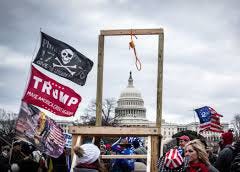This Fall, the Forecasts, and an Uncertain Future
As 2024 draws to a close, expect the usual retrospectives with New Year's predictions as their punchlines. Beware the soothsaying on what will happen next.
Work expands to fill the time allotted for completion, C. Northcote Parkinson wrote 70 years ago in a satirical essay that became his famous law. So will the political soothsaying this fall. Expect the predictions for 2025 to fill the maximum space available in newspapers, on air, and even the web’s bottomless digital pit.
This season more than the usual skepticism is in order when it comes to the seers’ annual rite and its results. The reason: the monumental uncertainties in election ahead and its aftermath. The most important is Donald Trump’s assault on the country’s democratic process and the rising risk of political instability it presents.
Political chaos is not a threat most Americans have top of mind. Witness the news stories on the Republican Party’s push to delegitimize the election in Georgia, Arizona, Nevada and Michigan. The media’s coverage is detailed, but its warning message mundane, with its importance buried in the news cycle’s daily play-by-play.
As the GOP’s sequel to Trump’s effort four years ago, the rollout of the Big Lie 2.0 in Georgia is well underway. Combined with new state laws aimed at voter suppression, Trump loyalists on the state election board only weeks before the election have made changes in the rules giving county officials carte blanche to meddle in vote counting.
The board’s Republicans, a majority dominated by 2020 election deniers, represent trouble for more than Georgia this year. Their latest decision to require hand-counts of ballots, a ludicrous leap into the 19th Century, lays bare their strategy, if Trump loses— to disrupt vote counting and again open the door to his stolen election claim.
The Democratic Party is suing to throw out the changes and a trial is set for October 1. But the courts are just one venue where confrontation is expected. With poll workers facing death threats and harassment, election officials and law enforcement across the country are girding for trouble, beefing up security for November’s vote.
In fact, in the groundless attacks on the vote’s integrity, Trump’s mendacity and the fabulists delivering the lies are not just undermining the democratic process and its institutions. They’re also stoking the potential for political unrest. Take the message the Republican Party is sending by sainting the mob that stormed Capitol Hill.
Trump, of course, is promising pardons. On cue, like Josef Goebbels’ defense of the Nazi Brown Shirt street brawlers who attacked Weimar Germany’s democracy, the GOP propagandists are painting the January 6th insurrectionists as guilty only of patriotic enthusiasm that led them to forget to check their brass knuckles at the door.
The Republicans’ obliviousness to the goals of their helpmates abroad also is striking. Already hard at work seeking to damage Americans’ confidence in their democracy, Russian, Chinese, and Iranian disinformation is helping their subversion. More political attacks to foment domestic social and political discord are certain in the weeks ahead.
Not everyone is missing the warning signs. US allies are deeply worried. While the Kamala Harris candidacy has evened the polls, in Europe and Asia it hasn’t lessened concern: the war in Ukraine, China’s challenge, and the Middle East morass, among critical issues and crises, will turn on November’s effect on the US global role.
The September debate’s moderators didn’t dig into Trump’s election threats or their possible aftermath. Two-thirds of Americans—68 percent—are worried about another January 6, according to a May Reuters/Ipso poll; 83 percent of Democrats and 65 percent of Republicans fear extremists will resort to violence again this year.
As for Harris, her debate strategy seemed to dodge nailing Trump for his Big Lie. It’s unfortunate, given its consequences as a catalyst for the campaign’s ugly politics and the long term threat. Three months and two assassination attempts later, Trump’s even more rabid rhetoric underscores it’s an issue she shouldn't continue to avoid.
Indeed, the Republican Party’s unfolding offensive to undermine the election’s legitimacy will do far more than bring bogus challenges to a Democratic presidential victory in November, if it occurs.
Writing six months ago, the Eurasia Group, a political risk consultancy, detailed its view of the American political landscape to make the point: a country politically polarized, unable to find common ground on strategic issues, and cramped into contending corners by its growing culture wars.
The state of American politics, the Eurasia Group judged, is the greatest threat to global stability. “The United States is already the world’s most divided and dysfunctional advanced industrial democracy,” its report on global risks concluded. “The 2024 election will exacerbate this problem no matter who wins.”



